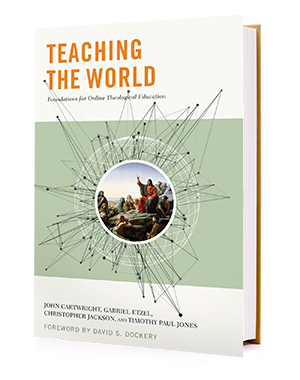Teaching the World: Foundations for Online Theological Education
by John Cartwright, Gabriel Etzel, Christopher Jackson, and Timothy Paul Jones (Baker Academic 2017, $19.99)
Review by RuthAnne Irvin
Humans interact with more technology today than ever before. Most traditional forms of education, media, and communication shifted with technological advances, that brought both advantages and prospective challenges. One of those advantages is the opportunity for distance education. Students can enroll in courses from home, eliminating the need to uproot their family, career, or other circumstances in order to pursue an education. In recent years, the growth of online theological education has increased as more institutions offer degrees taught online by seminary faculty and staff.
 In their new book, Teaching the World: Foundations for Online Theological Education, John Cartwright, Gabriel Etzel, Christopher Jackson, and Southern Seminary’s Timothy Paul Jones collaborate to bring a diverse collection of essays about the origins of online theological education, the benefits, the objections, and prospective ways to produce a fruitful online theological education experience for distance learning students.
In their new book, Teaching the World: Foundations for Online Theological Education, John Cartwright, Gabriel Etzel, Christopher Jackson, and Southern Seminary’s Timothy Paul Jones collaborate to bring a diverse collection of essays about the origins of online theological education, the benefits, the objections, and prospective ways to produce a fruitful online theological education experience for distance learning students.
The main argument for online education, the authors write, is Paul’s example in his epistles in the New Testament. They introduce the topic discussing the external and internal reasons institutions often initiate online learning programs. External factors such as student body growth, monetary needs, or growth in resources all affect the decision to offer an online program. Internal issues, such as theological and pedagogical ideas that change over time, often affect the decision to start or terminate online programs.
As institutional leadership begin to think through how to offer the best online theological education, the authors use Paul’s epistles as both an example to follow, and as cautions for potential issues with distance education. They discuss issues ranging from the power of presence with a physical classroom, the importance of place and education, and social presence theory. One common objection to online education is the priority of presence, but throughout Teaching the World the authors provide a fair and balanced examination to both online and in person theological education.
“Giving priority to traditional, face-to-face formats does not preclude the use of online formats in theological education, just as the primacy of visitation in Paul’s apostolic ministry did not preclude the use of the epistle,” they write.
Online theological education’s legitimacy correlates with Paul’s epistles, which form much of the authors’ arguments for online learning. Instead of standing as separate instances of instruction, the authors emphasize how Paul’s epistles held significance as “not merely supplemental to his visits but were rather an integral part of his grater cohesive apostolic mission.”
The authors continue the book with essential aspects of a successful online program, including the integrity and spiritual leadership required of professors. The role of a professor in the spiritual formation of his or her students is an imperative aspect of education, and it is the institution’s responsibility to ensure the professor is equipped to train students both academically and encourage them spiritually.
“For the online faculty member, servant leadership through one’s courses and interaction with students must become a way of life, as the image of God affects all reads of life, including relationships to God, to others, and to God’s creation.”
This book is a good starting place for those interested in learning more about the necessary foundational theories and historical arguments for and against online theological education. Students taking online courses will benefit from the authors’ thorough examination of the benefits and implications of distance education. Each author writes from their experience in education and ministry, and they provide a robust selection of topics for readers, including application and practical questions at the end of each chapter, creating an immediate opportunity to think critically about each topic.




